What is a robots.txt file?

So see here: 18 indispensable Google tools for you as a marketer/business owner.
(In order from which I use the most, to which I use the least)
If you are into SEO or any online marketing at all, Google Chrome is the browser to use.
Why?
Because within Chrome you can use a host of useful extensions that make online marketing easier.
Consider, for example:
In addition, I also always recommend Chrome, because you can inspect websites (right-click and then inspect) to see the code, to see how the website loads, how the website looks per device, and where any errors are within the website.
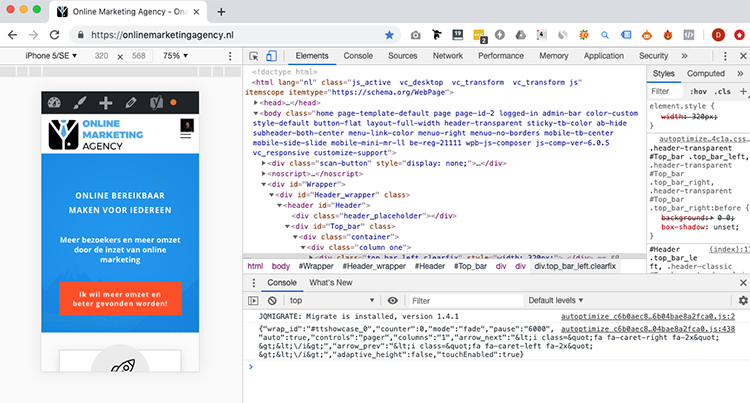
Google Chrome Inspect
For every entrepreneur and every marketer, one thing is most important: results.
Whether that's in the form of sales, inquiries, more visitors or perhaps more revenue.
With Google Analytics, make it measurable!
And with Analytics, you can find out almost anything about the visitors within your website.
Consider:
There is no entrepreneur or marketer I don't think needs Analytics.
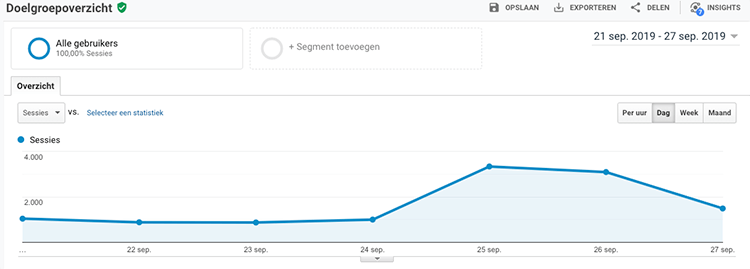
Google Analytics audience overview
Google Search Console is a program from Google that allows you to view and track your website's presence in Google.
Previously, Search Console was known as Google Webmaster Tools, so you might know it from there.
Search Console can be thought of as a kind of extra control between your website and Google, and with the tool Google gives you a little bit of power over the indexing of your website.
You can within the tool:
And much more :).
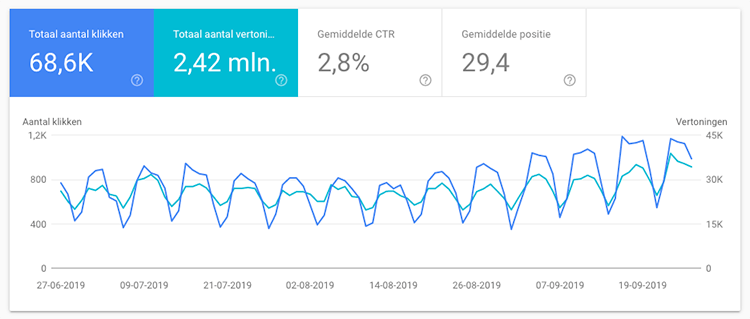
Google Search console performance screenshot
Google My Business is one of the nicest Google tools I personally like.
This is because Google is adding many new features within My Company.
Consider the chat feature or the Google Post.
With Google My Business, you can make your website more findable locally.
By having your own page, you are more and more visible within Google, as well as within Google Maps, and people can leave reviews, for example.
Google My Business is also very user-friendly and also shows you information about how often someone has entered directions or clicked on the phone number, for example.
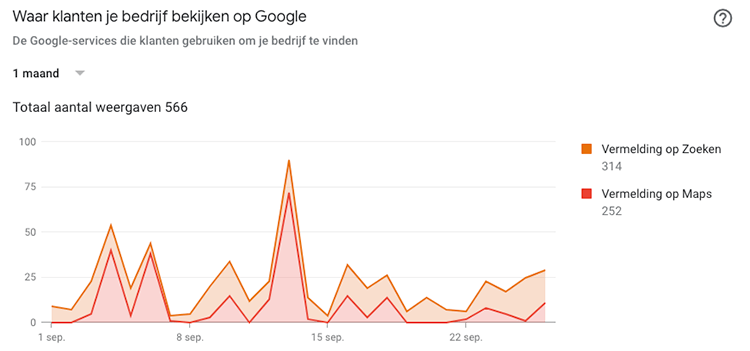
Google My Business data
I'm going to be honest right away ...
as a non-experienced SEO or online marketer, you don't really have much use for Tag Manager.
In fact, it is a program that you have to put quite a few hours into if you want to understand it and get the most out of it.
Google Tag Manager is a collection bin for all kinds of scripts and is designed to make your website even more measurable.
It is therefore the ideal complement to Google Analytics.
Would you like to use Hotjar or Google Optimize, for example?
If so, the best way to do this is through Tag Manager.
To make it concrete, I'll give you a few examples of what you can use Tag Manager for:
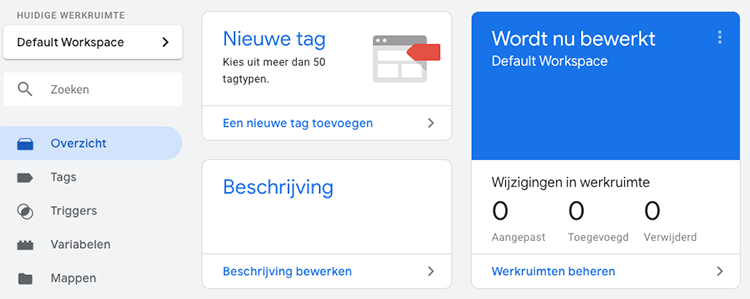
Google Tag Manager workspace
Google Drive is perfect for file sharing and is well known to the general public.
Therefore, it is not so much an online marketing tool.
With Drive, you can share files such as photos, texts, a keyword analysis or perhaps a video you want to post online.
This saves a lot of back and forth mail, documents getting lost and other annoyances.
Using Google Analytics is not that difficult, but being able to fully interpret the data and act on it is something entrepreneurs often find problematic.
That's where Google Data Studio comes in.
In fact, Data Studio is a tool from Google that allows you to aggregate, present and share information from Analytics and Search Console, for example, in the form of a report.
This makes demonstrating the effects of your campaigns (as a marketer) or auditing your marketer's work (as a business owner) a lot easier.
In addition, what I also unfortunately see going wrong are marketing agencies that send reports of ten A4s with all kinds of information about bounce rate, average session duration, pages per session and other SEO-related figures.
Very nice, but that is of no use to an entrepreneur.
Who really only cares about conversions.
And you can make that incredibly insightful with Data Studio.
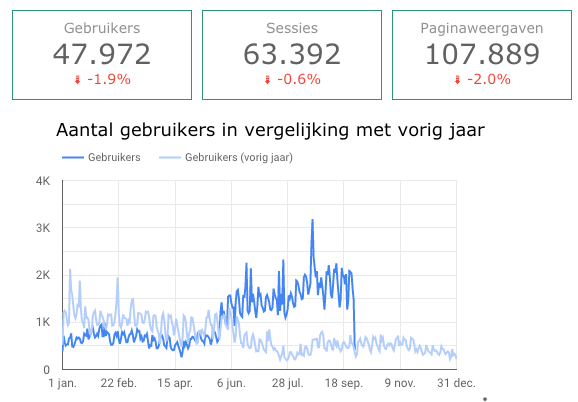
Part of the Data Studio report from Online Marketing Agency
Did you expect YouTube to be in this list?
And did you also know that YouTube is perhaps the second largest search engine after Google ?
And that it is owned by the search giant?
Now you do!
Besides being a source of knowledge or inspiration, YouTube is also the channel of choice to work on your branding or, for example, the visibility of your business.
In addition, Google and YouTube go hand-in-hand and may even mean that when you optimize your YouTube videos (did someone say YouTube SEO?), you become more findable in Google.
There are an awful lot of tools for testing the speed of your website.
An also Google has a tool that allows you to do that.
That, in fact, is Google Page Speed (also called Page Speed Insights).
With that, I can give you a quick technical speed check of your website to find out the areas of improvement to make your website even faster.
Moreover, you are presented with points of improvement for both mobile and desktop.
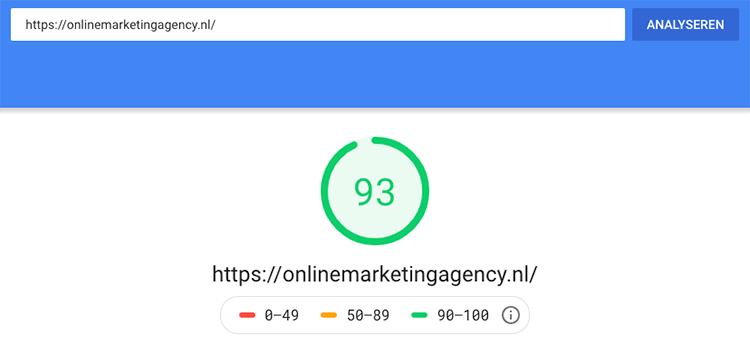
Google Page Speed score desktop
With Google Trends, you can find out how often a keyword is searched for per week and per month.
Ideal if you sell seasonal products, for example.
You can then see exactly when you should already be ready for it online, and so you can also determine when you need to start working to increase your online findability.
In addition, within Google Trends you also get more information about related topics/search queries, interests by region and can even compare keywords.

Google Trends interest over time
When something is written about you or your company online, of course you want to know about it right away.
You may have to respond to them, you may have to ask for a link they forgot about or you may want to share this content on your social media channels.
With Google Alert, you get an instant email whenever a particular term is used online.
This is entirely up to you!
So you can add your own name, your company name or, for example, the industry or niche you are in.
Pro tip: You can also set up Google Alerts on your competitors' names to find out where they get their backlinks from.
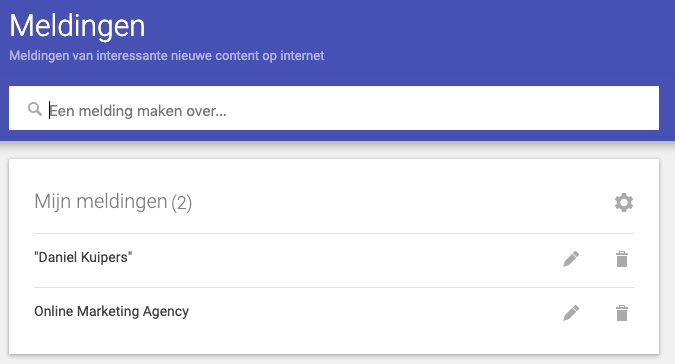
Google Site Kit is unique in this list.
This is because it is the only WordPress plugin that combines data from Search Console, Page Speed, Google Optimize and Analytics, among others, into the backend of your WordPress website.
As a result, you no longer have to go to each of the separate websites, but you can find all the information in one place.
Do you think round, red buttons or square, green buttons work better within your website?
I really have no idea.
But you can find that out with Google Optimize.
Google Optimize is an A/B testing tool that allows you to test different assumptions to see what works best within your website and within your target audience.
For example, you can test locations of action buttons, the effect of different photos or the size of a contact form.
In an A/B test, 50% of your target audience will see version A and 50% of your target audience will see version B.
So you can very easily compare what works and what doesn't.
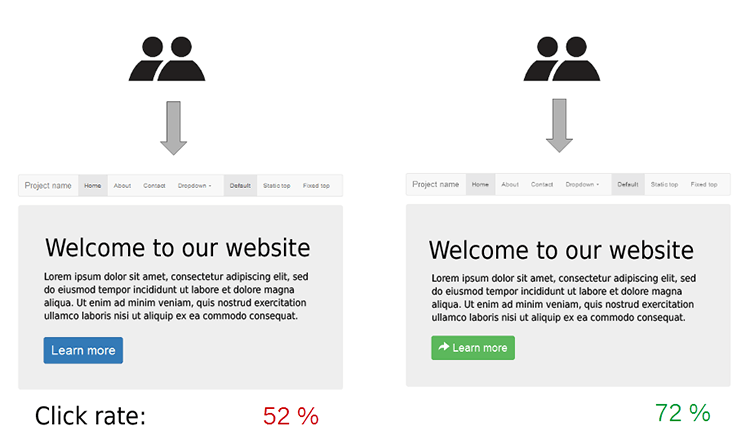
A/B test example
In addition to search engine optimization (SEO), it is of course also possible to advertise within the search engine (SEA).
And to do that within Google, you use the Google Ads tool (formerly known as Google Adwords).
With Google Ads, you can set up all kinds of paid campaigns and ads to market your website.
These can include text ads in Google, but also display ads on websites such as Nu.nl, etc.
SEO and SEA go well together, and advertising in Google can be especially beneficial if you are not yet easily findable organically.
We know by now that the load time of your website is an incredibly important ranking factor within Google.
And we also know that Google now indexes mobile-first websites.
With that in mind, Google has launched an alternative to Page Speed Insights.
Namely, Test My Site - Think with Google.
Test My Site allows you to perform the following actions:
The great advantage of Test My Site is that it makes the data very concrete and user-friendly.
For example, Page Speed Insights does not do that in my opinion.
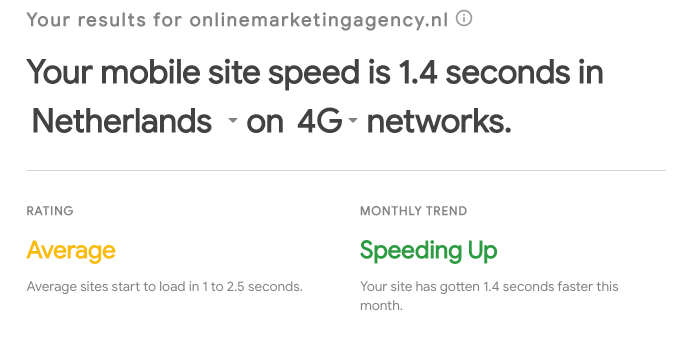
Test My Site - Think with Google result Online Marketing Agency
If you know me, you know that I am not a fan of the Google Keyword Planner.
But, since the tool is widely used and well-known within SEO and Google land, I have to include it in this list.
The Google Keyword Planner is a program you use while doing keyword research.
For each keyword, the Keyword Planner tells you how often that particular keyword is searched for each month and immediately shows you related searches as well.
Then you can select the most important keywords and then deploy them in your content strategy.

Google Keyword Planner
Did you know that Google has its own tool that can check your website for performance, accessibility, best practices and SEO?
After all, that is what Web.dev does and can do!
When you enter your Web site in Web.dev and click "Run audit" you are presented with a laundry list of areas for improvement.
These areas for improvement are broken down by impact.
The areas of improvement with the highest impact are at the top and those with the lowest impact are at the bottom.
Ideal while doing a baseline measurement, for example.

Web.Dev reporting
And we have arrived at number 18: Squoosh.
A Google tool that allows you to very easily optimize images for both quality and size, without having to install anything on your website.
This is all done in the browser.
The advantage of Squoosh is that you get to see the non-optimized image on the left side of the screen and the optimized image on the right side.
You can see exactly the difference and determine if you are not over-optimizing the photo.
Those were 18 indispensable Google tools for you in a row.
If you have questions about any of the tools mentioned or are you missing any?
If so, let me know in the comments.
Written by: Daniel Kuipers
Daniel is the founder of Online Marketing Agency. He constantly scours the Internet for the latest gadgets and tactics and blogs about them in understandable language. Well, sometimes.